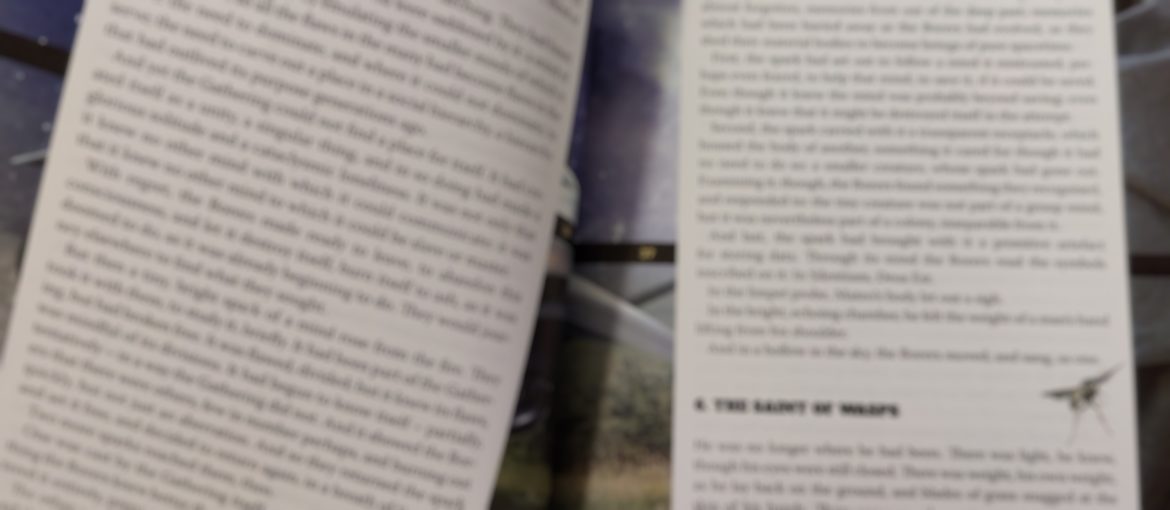Cofiwch Aberystwyth, Val Nolan. It’s pleasing to see a near-future specfic story set in Wales and engaging with Britain’s current political and cultural schisms and travails, even if this is largely set dressing for a story of betrayal, denial and breakdown. Wait, actually…
There’s a tremendous sense of place in post-nuclear Aberystwyth and whilst the historical events that produced this setting feel improbable, is that not always true of many events until history and humanity deliver them?
We follow a “top 500” vlogger and the rest of her team as they explore this setting, risking radiation amongst the ruins in search of footage. This story is somewhat let down by a conclusion that presents binary options for a character, and tells us only that they chose – not what – but this indeterminacy doesn’t really fit with the character as experienced, so underwhelms. Otherwise, this is a story I greatly enjoyed.
Rocket Man, Louis Evans. Launching from a simple premise – atmospheric conditions prevented the development of the unmanned ICBM – this story takes us into the world of the rocket men: USAF elite who spend their days marking time and waiting for armageddon. Our protagonist dreams of Moscow and his rocket coming down upon it; he dreams every night, and he has a secret mission, and his story changes all the time. To say much more than that would be to spoil the experience of this story, which is compact, entertaining and humanistic. Miss! Miss! Miss!
Organ of Corti, Matt Thompson. As the climate crisis eats into the Iberian peninsula, coating Madrid in layers of sand, an out of work entomologist chooses to hire onto an expedition into the new desert rather than join his girlfriend in Argentina. This academic joins five others as they journey into the new desert, and find there strange new structures, which open into tunnels, which snake deep beneath the surface.
This story is highly effective at conveying a sense of the eerie in its underground tunnels, and exercises restraint rather than tipping into outright horror. Of course, the expedition still disappears one by one until only our protagonist remains. Only his final decision lacks impact: I can see how he might arrive at the conclusion he did, but I wish it was less of a bolt from the blue.
Carriers, James Sallis. A story following a small cast of characters in a country, nation or region experiencing slow collapse. The state is weak. Factions vie for power as police and pseudo-paramilitary gangs roam the streets. Those caught between and beneath the violence of power suffer. One of our characters is Eric, a young man – a boy, really, at the time when he first kills men, in this case the soldiers who looted and abducted his small community. Another is a doctor working to help the people of his city.
In the story’s first part the doctor and Eric meet by way of an unnamed group of rebels whose ideology is never surfaced; Eric has been killing his way through state apparatchiks, or something like that. The doctor heals him. Their mutual acquaintance dies. The doctor heals Eric again, and then they part ways. In the story’s second part, we have decamped to the countryside, and follow what I at first thought was two characters but actually seems to be three as they discuss the violence of their pasts. Here the story settles further into its affective mode, where the characters spend much time eliding the details of their past lives, showing glimpses of trauma.
I must admit that the story didn’t really work for me. Its prose and psychological writing are strong, but the focus on the silences born of traumatic emotional experience for survivors evacuates meaning from events writ onto the world-canvas, producing a world where actors act to make things happen but never for reasons, and never with the intent or result of imposing meaning. Perhaps that is the point of those who are seen only as subject to history rather than actors toward its composition, but this doesn’t really gel with the character of men who kill for causes? And surely even victims and the subjects of history have interests and belief structures, even in the context of the complete breakdown of existent institutions? Still, a very engaging story to grapple with.

